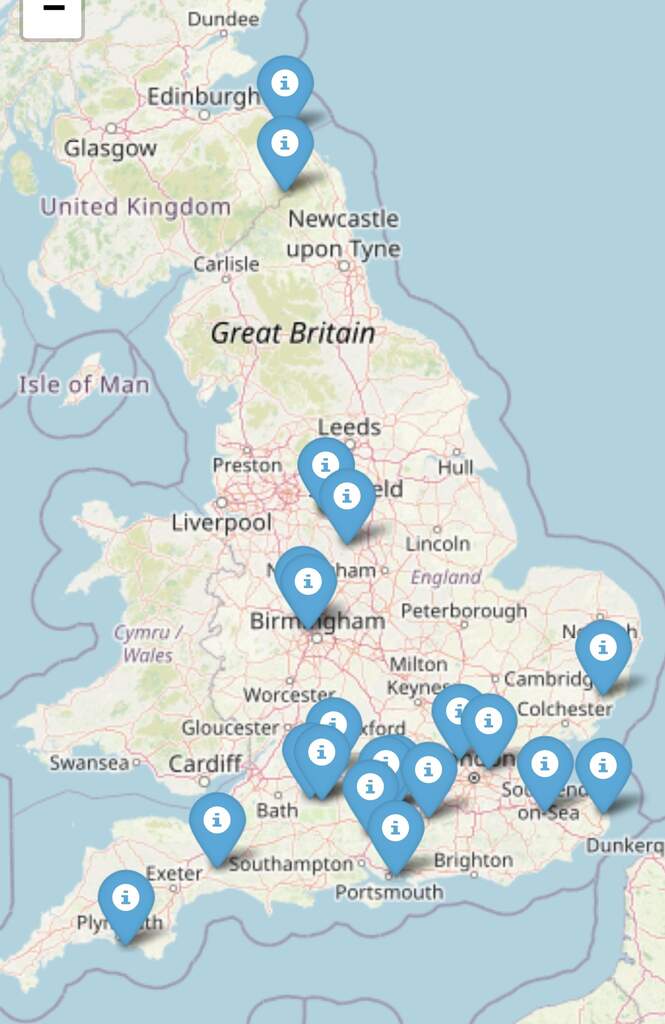Fancy dropping in on Odin this weekend? Several place names in England and Scotland are believed to be derived from the name of the god Odin (Old Norse Óðinn) or his Anglo-Saxon counterpart, Woden (Old English Wōden). Here is a list of such places:
England:
Odin Mine: Located near Castleton in Derbyshire.
Odin Sitch: Also near Castleton, Derbyshire.
Wambrook: In Somerset, interpreted as "Woden's Brook."
Wampool: In Hampshire, meaning "Woden's Pool."
Wanborough: Found in both Wiltshire and Surrey, derived from "Wōdnes-beorg," meaning "Woden's Barrow."
Wansdyke: An ancient earthwork in southern England, translating to "Woden's Dyke."
Wanstead: In Essex, meaning "Woden's Stead."
Wednesbury: Located in the West Midlands, translating to "Woden's Burgh."
Wednesfield: Also in the West Midlands, meaning "Woden's Field."
Wensley: In Derbyshire, interpreted as "Woden's Meadow."
Wembury: In Devon, derived from "Woden's Hill" or "Woden's Barrow."
Woden's Barrow: Also known as Adam's Grave or Walker's Hill, a barrow in Wiltshire.
Woden Hill: Located in Hampshire, part of Bagshot Heath.
Wonston: In Hampshire, meaning "Woden's Town."
Woodbridge: In Suffolk, originally "Wodenbrycge," meaning "Woden's Bridge."
Woodnesborough: In Kent, translating to "Woden's Burgh."
Woodway House: Named after "Woden's Way."
Wormshill: Derived from "Woden's Hill."
Grimsdyke and Grim's Ditch: Ancient earthworks; "Grim" is another name associated with Woden.
Scotland:
Edin's Hall Broch: Located in Berwickshire, sometimes referred to as "Odin's Hall Broch" and originally "Wooden's (Woden's) Hall."
Grim's Dyke: Another term used for the Antonine Wall.
Woden Law: An Iron Age hillfort in the Cheviot Hills near the border with Northumberland, meaning "Woden Hill."
England:
Odin Mine: Located near Castleton in Derbyshire.
Odin Sitch: Also near Castleton, Derbyshire.
Wambrook: In Somerset, interpreted as "Woden's Brook."
Wampool: In Hampshire, meaning "Woden's Pool."
Wanborough: Found in both Wiltshire and Surrey, derived from "Wōdnes-beorg," meaning "Woden's Barrow."
Wansdyke: An ancient earthwork in southern England, translating to "Woden's Dyke."
Wanstead: In Essex, meaning "Woden's Stead."
Wednesbury: Located in the West Midlands, translating to "Woden's Burgh."
Wednesfield: Also in the West Midlands, meaning "Woden's Field."
Wensley: In Derbyshire, interpreted as "Woden's Meadow."
Wembury: In Devon, derived from "Woden's Hill" or "Woden's Barrow."
Woden's Barrow: Also known as Adam's Grave or Walker's Hill, a barrow in Wiltshire.
Woden Hill: Located in Hampshire, part of Bagshot Heath.
Wonston: In Hampshire, meaning "Woden's Town."
Woodbridge: In Suffolk, originally "Wodenbrycge," meaning "Woden's Bridge."
Woodnesborough: In Kent, translating to "Woden's Burgh."
Woodway House: Named after "Woden's Way."
Wormshill: Derived from "Woden's Hill."
Grimsdyke and Grim's Ditch: Ancient earthworks; "Grim" is another name associated with Woden.
Scotland:
Edin's Hall Broch: Located in Berwickshire, sometimes referred to as "Odin's Hall Broch" and originally "Wooden's (Woden's) Hall."
Grim's Dyke: Another term used for the Antonine Wall.
Woden Law: An Iron Age hillfort in the Cheviot Hills near the border with Northumberland, meaning "Woden Hill."
Fancy dropping in on Odin this weekend? Several place names in England and Scotland are believed to be derived from the name of the god Odin (Old Norse Óðinn) or his Anglo-Saxon counterpart, Woden (Old English Wōden). Here is a list of such places:
England:
Odin Mine: Located near Castleton in Derbyshire.
Odin Sitch: Also near Castleton, Derbyshire.
Wambrook: In Somerset, interpreted as "Woden's Brook."
Wampool: In Hampshire, meaning "Woden's Pool."
Wanborough: Found in both Wiltshire and Surrey, derived from "Wōdnes-beorg," meaning "Woden's Barrow."
Wansdyke: An ancient earthwork in southern England, translating to "Woden's Dyke."
Wanstead: In Essex, meaning "Woden's Stead."
Wednesbury: Located in the West Midlands, translating to "Woden's Burgh."
Wednesfield: Also in the West Midlands, meaning "Woden's Field."
Wensley: In Derbyshire, interpreted as "Woden's Meadow."
Wembury: In Devon, derived from "Woden's Hill" or "Woden's Barrow."
Woden's Barrow: Also known as Adam's Grave or Walker's Hill, a barrow in Wiltshire.
Woden Hill: Located in Hampshire, part of Bagshot Heath.
Wonston: In Hampshire, meaning "Woden's Town."
Woodbridge: In Suffolk, originally "Wodenbrycge," meaning "Woden's Bridge."
Woodnesborough: In Kent, translating to "Woden's Burgh."
Woodway House: Named after "Woden's Way."
Wormshill: Derived from "Woden's Hill."
Grimsdyke and Grim's Ditch: Ancient earthworks; "Grim" is another name associated with Woden.
Scotland:
Edin's Hall Broch: Located in Berwickshire, sometimes referred to as "Odin's Hall Broch" and originally "Wooden's (Woden's) Hall."
Grim's Dyke: Another term used for the Antonine Wall.
Woden Law: An Iron Age hillfort in the Cheviot Hills near the border with Northumberland, meaning "Woden Hill."





